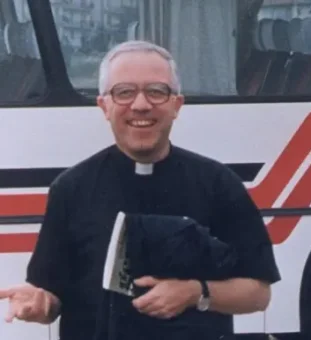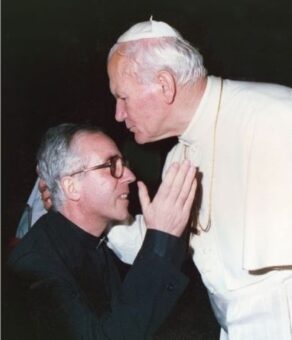A priest from Gaeta, Italy, who, being a parish priest, not only spent himself for his parishioners, but involved them in service to their city.  Fr Cosimino Fronzuto was an Italian priest who was born in Gaeta in 1939. He died at the age of 49 in 1989 after an intense life spent serving his neighbor, the needy and the society of his town. He lived near the sea, but disliked swimming and was afraid to go deep. One day, as a child, wanting to overcome this difficulty, he dived in and, to show that he had touched the bottom, he placed his hand in the sand, picking up, to his amazement, a small iron crucifix, which he then carried with him all his life. In 1963 he was ordained a priest and began service as vice-rector of the local diocesan seminary. He came in contact with the spirituality of unity and joined the Focolare Movement. In 1967 he was appointed parish priest of St. Paul the Apostle Parish in Gaeta, a position he held until the last days of his life. In those years the Parish Movement, an expression of the Focolare Movement in the local Church, flourished and generated a lot of fruits especially among the young people, who today are engaged in the city as priests, in the family, in political life and in various civil and professional spheres, in the different realities of the Focolare Movement and who continue to be very active in parish life as well. During the pastoral ministry he exercised in the parish, with his style full of love and attention to all, especially to the least ones (single mothers, ex-convicts, drug addicts, evictees, runaways), he set up the community by simply, but strongly and decisively, aiming only to live the Gospel in all situations and in the most diverse realities. Thus he did not lack opportunities to take a stand even against so many social realities that were far from a truly human and Christian dimension.
Fr Cosimino Fronzuto was an Italian priest who was born in Gaeta in 1939. He died at the age of 49 in 1989 after an intense life spent serving his neighbor, the needy and the society of his town. He lived near the sea, but disliked swimming and was afraid to go deep. One day, as a child, wanting to overcome this difficulty, he dived in and, to show that he had touched the bottom, he placed his hand in the sand, picking up, to his amazement, a small iron crucifix, which he then carried with him all his life. In 1963 he was ordained a priest and began service as vice-rector of the local diocesan seminary. He came in contact with the spirituality of unity and joined the Focolare Movement. In 1967 he was appointed parish priest of St. Paul the Apostle Parish in Gaeta, a position he held until the last days of his life. In those years the Parish Movement, an expression of the Focolare Movement in the local Church, flourished and generated a lot of fruits especially among the young people, who today are engaged in the city as priests, in the family, in political life and in various civil and professional spheres, in the different realities of the Focolare Movement and who continue to be very active in parish life as well. During the pastoral ministry he exercised in the parish, with his style full of love and attention to all, especially to the least ones (single mothers, ex-convicts, drug addicts, evictees, runaways), he set up the community by simply, but strongly and decisively, aiming only to live the Gospel in all situations and in the most diverse realities. Thus he did not lack opportunities to take a stand even against so many social realities that were far from a truly human and Christian dimension.  He wrote in his diary, “We observed that during catechesis there were children who were quite unkept, undernourished, I also remembered that in that same family the older children had received neither Confirmation nor Communion, nothing at all. We were around the middle of March, and I thought, if we don’t get them now, we won’t get them again. So I went to that house and realized (it was about 12:30 p.m.) that pasta was simply being cooked and that there would be nothing else for everyone to eat. I noticed that although the head of the family was a small businessman, even the glass was missing from the door that hung over the balcony, and in this room, where the glass was missing, about ten children were sleeping. Immediately I began to talk about catechism, but I also tried to pay attention and look around. Then in the evening, after adoration, I spoke to the community about this situation. As I too became aware of it, I collected all the data: economic instability, seizure notices, children’s health problems. Then the morning was spent thinking only of this family, to see according to different aspects how things were, sharing the work, securing the food and, at the same time, keeping hold of the grown-ups so that they would receive real catechesis. One evening I realized that I had to make a proposal to everyone. Within myself I had decided, but what is the worth of my decision as a parish priest? It could possibly be valuable, but I wanted the decision to come from God, thus, a decision made in unity with the community which gave me the assurance that it was God Himself working. So I proposed to make available to this family approximately two million (liras) we had in the parish to solve the situation until they were able to go back to work again. I can say that from the very first moment everyone was supportive. That was the beginning, then this situation had several developments. Yesterday, I attended a condominium meeting in which they had decided to take away from the father the work that he had started and had not finished. I did everything so that he would complete it and could also have some money. The journey is still going to be very long, it’s more than a month that we have been beside him, close to him, and he says, “My desire to live is coming back, my desire to live is coming back.” But the intervention has not been operated by me alone, the intervention has been a bit of a collective one, many people are continuously bringing things that are needed, however, we are not so much concerned about the lack of things, but we are concerned about not making people lack love, because they have been people who have obviously been unloved, they have in fact been trampled in certain rights(…)”.
He wrote in his diary, “We observed that during catechesis there were children who were quite unkept, undernourished, I also remembered that in that same family the older children had received neither Confirmation nor Communion, nothing at all. We were around the middle of March, and I thought, if we don’t get them now, we won’t get them again. So I went to that house and realized (it was about 12:30 p.m.) that pasta was simply being cooked and that there would be nothing else for everyone to eat. I noticed that although the head of the family was a small businessman, even the glass was missing from the door that hung over the balcony, and in this room, where the glass was missing, about ten children were sleeping. Immediately I began to talk about catechism, but I also tried to pay attention and look around. Then in the evening, after adoration, I spoke to the community about this situation. As I too became aware of it, I collected all the data: economic instability, seizure notices, children’s health problems. Then the morning was spent thinking only of this family, to see according to different aspects how things were, sharing the work, securing the food and, at the same time, keeping hold of the grown-ups so that they would receive real catechesis. One evening I realized that I had to make a proposal to everyone. Within myself I had decided, but what is the worth of my decision as a parish priest? It could possibly be valuable, but I wanted the decision to come from God, thus, a decision made in unity with the community which gave me the assurance that it was God Himself working. So I proposed to make available to this family approximately two million (liras) we had in the parish to solve the situation until they were able to go back to work again. I can say that from the very first moment everyone was supportive. That was the beginning, then this situation had several developments. Yesterday, I attended a condominium meeting in which they had decided to take away from the father the work that he had started and had not finished. I did everything so that he would complete it and could also have some money. The journey is still going to be very long, it’s more than a month that we have been beside him, close to him, and he says, “My desire to live is coming back, my desire to live is coming back.” But the intervention has not been operated by me alone, the intervention has been a bit of a collective one, many people are continuously bringing things that are needed, however, we are not so much concerned about the lack of things, but we are concerned about not making people lack love, because they have been people who have obviously been unloved, they have in fact been trampled in certain rights(…)”.  On Sunday, Jan. 21, 2024, the Archbishop of Gaeta, Msgr. Luigi Vari in a cathedral packed with civil and religious dignitaries and the faithful, began the cause of beatification of Don Cosimino Fronzuto.
On Sunday, Jan. 21, 2024, the Archbishop of Gaeta, Msgr. Luigi Vari in a cathedral packed with civil and religious dignitaries and the faithful, began the cause of beatification of Don Cosimino Fronzuto.
Carlos Mana




0 Comments